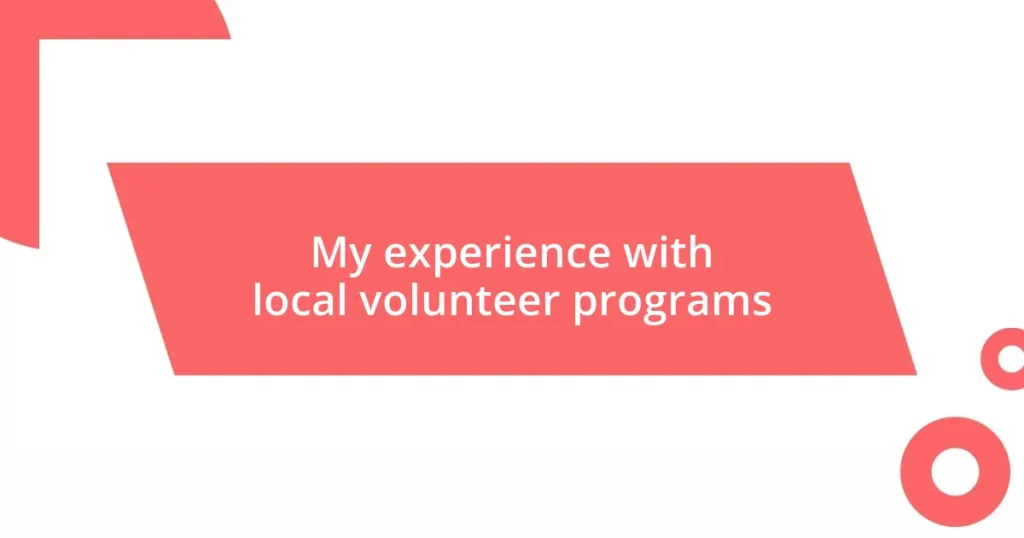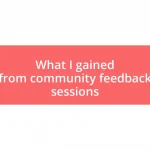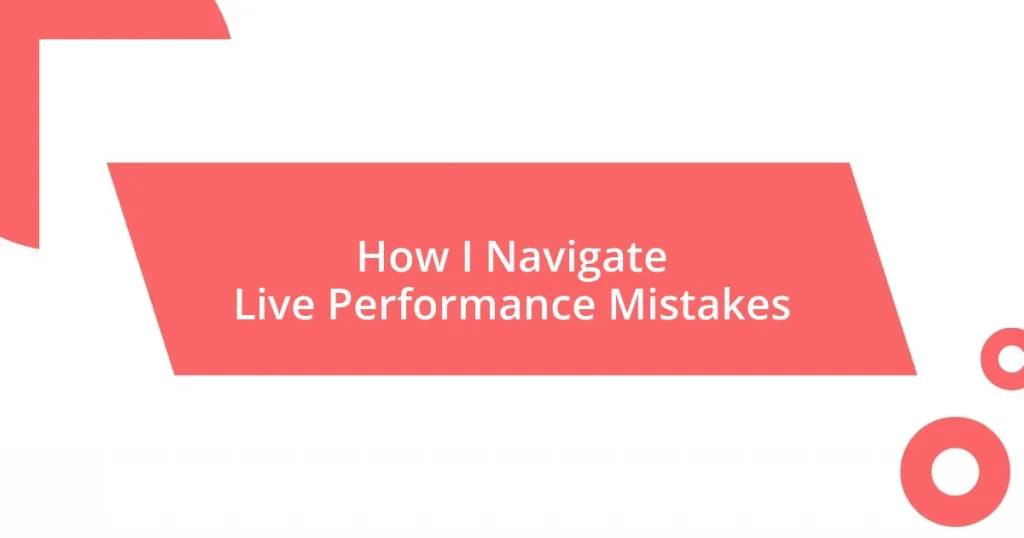Key takeaways:
- Volunteering fosters connections and community bonds, transforming strangers into friends through shared goals.
- Choosing a volunteer program aligned with personal interests enhances engagement and enjoyment.
- Understanding requirements and preparing effectively leads to a more meaningful volunteering experience.
- Local volunteering promotes personal growth and deeper awareness of community issues, impacting both the volunteer and those served.
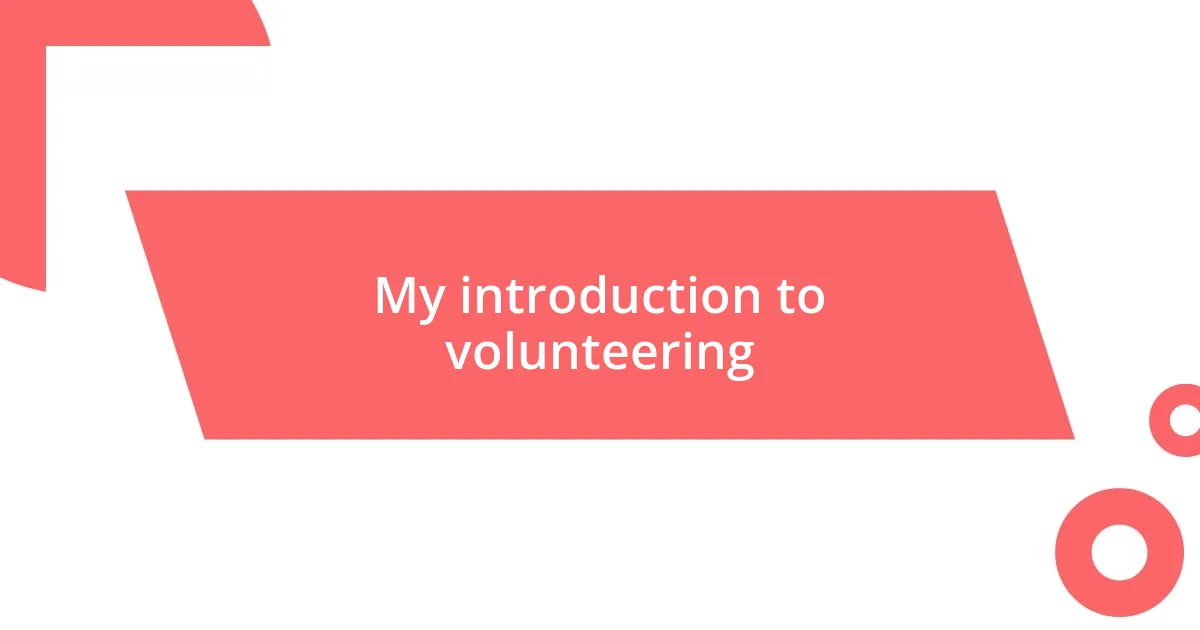
My introduction to volunteering
Volunteering first caught my attention during a local community event I attended. I remember sitting on the sidelines, watching volunteers excitedly engage with attendees, and I couldn’t help but wonder: what drives them to give their time so selflessly? That moment sparked a curiosity in me, prompting me to understand the deeper impact of volunteering on both the community and the individual.
My first experience came when I decided to join a neighborhood clean-up initiative. As I picked up trash alongside others, I felt a sense of camaraderie developing. It was fascinating how a simple shared goal could transform strangers into friends, and it hit me—volunteering wasn’t just about service; it was about connection. I left that day feeling lighter, both physically and emotionally, realizing the joy in contributing to something greater than myself.
Reflecting on this journey, I often think about how these early experiences shaped my outlook on giving back. Each interaction, every shared laugh, and even the challenges we faced together provided lessons I still cherish today. Isn’t it interesting how stepping out of our comfort zones can lead to growth that transcends the act of volunteering itself?
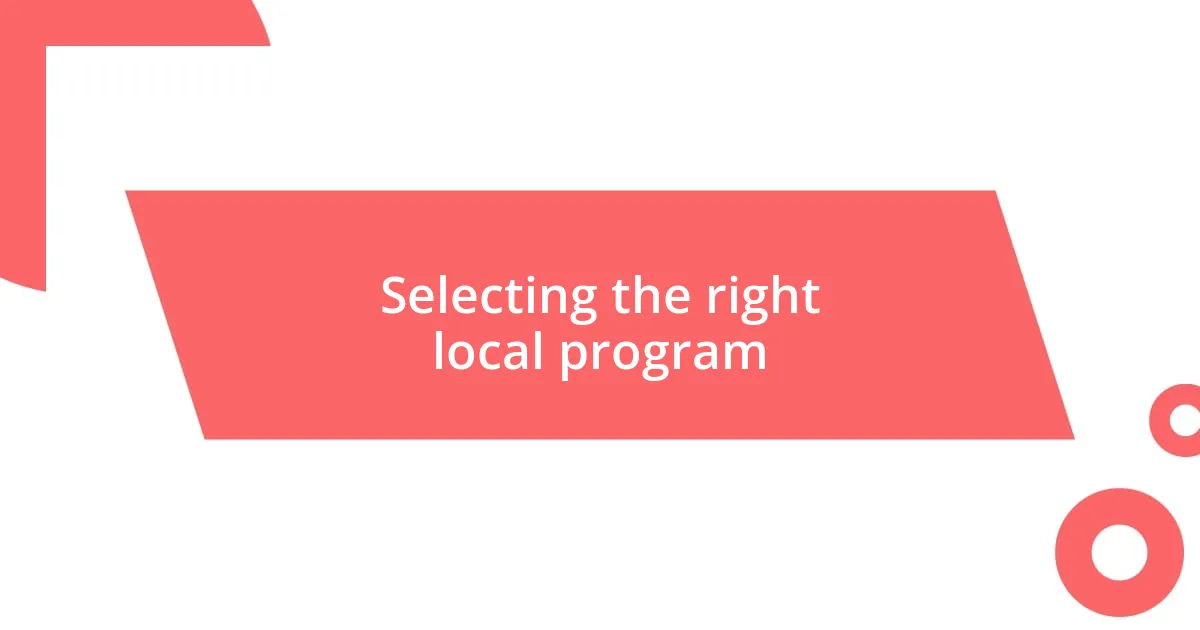
Selecting the right local program
Choosing the right local volunteer program can significantly enhance your experience. I once faced a dilemma when I had several options, each promising different kinds of engagement. I quickly realized that aligning the program’s mission with my passions made a tremendous difference in my participation and overall enjoyment.
Another key factor to consider is the commitment level required by each program. For instance, a weekly commitment versus a one-time event can impact your schedule and willingness to dive in. I remember selecting a short-term project that allowed me to sample what volunteering was like without a long-term commitment. That little decision opened doors to future opportunities that I deeply valued.
Finally, researching the reputation of the organization running the program can provide insights into their impact and ethics. I once volunteered with a group that wasn’t transparent about their initiatives, leaving me feeling uneasy about the contributions I was making. It taught me to always evaluate the values of the organizations before committing my time and effort.
| Criteria | Personal Experience |
|---|---|
| Alignment with Interests | Fostering genuine engagement. |
| Commitment Level | Tasting volunteering without overwhelm. |
| Organization’s Reputation | Understanding the true impact of my service. |
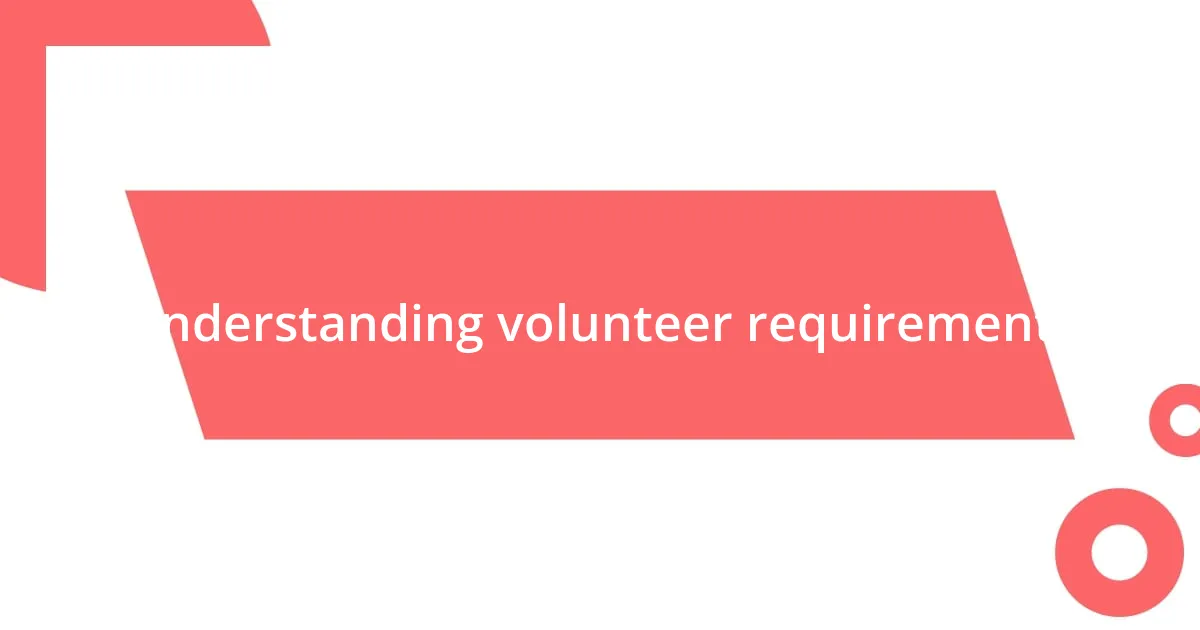
Understanding volunteer requirements
Understanding volunteer requirements is crucial for a fulfilling experience. Each program has different prerequisites, and I learned this firsthand during my initial volunteer searches. For example, some roles may require a specific age or skill set, while others might ask for background checks, especially those involving vulnerable populations. I vividly recall the surprise I felt when I encountered a program that required a training session before I could participate. It made me appreciate the importance of preparation and commitment that different organizations seek.
Here’s a brief overview of common volunteer requirements:
- Age Restrictions: Some programs may have minimum age limits or require adult supervision for younger volunteers.
- Background Checks: Especially in youth-focused or sensitive settings, background checks ensure safety and trust.
- Training Sessions: Many organizations provide training to equip volunteers with the necessary skills and knowledge for their roles.
- Time Commitment: Some programs may require a specific number of hours or a regular schedule, while others can be more flexible.
- Skill Requirements: Certain volunteering opportunities, like tutoring or medical assistance, may require specific qualifications or expertise.
Understanding these nuances helped me align my expectations and ultimately led to a more meaningful engagement with the communities I sought to serve.
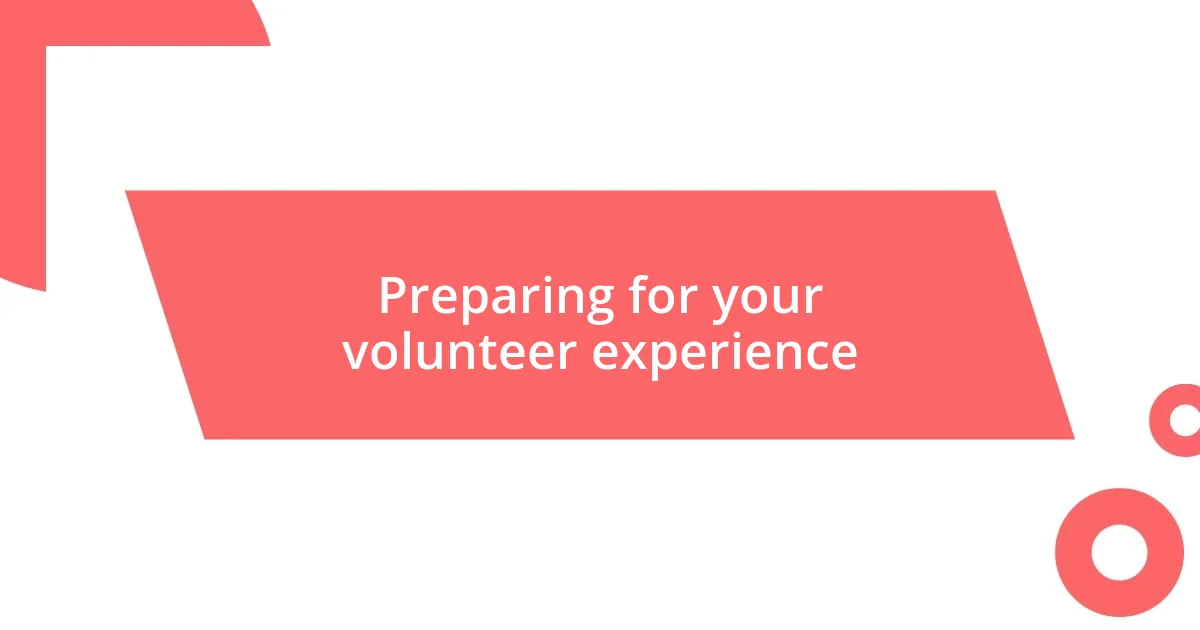
Preparing for your volunteer experience
Preparing for your volunteer experience can feel a bit overwhelming but also exciting. I remember the first time I prepared for my volunteer work; I felt a mix of nervousness and eagerness. What really helped me was jotting down what I wanted to achieve and how I could contribute. This simple step gave me clarity and motivation before diving in, transforming my nerves into enthusiasm.
Additionally, it’s essential to gather information not only about the program but also about the community you’re serving. I once stumbled upon an article about local issues while prepping for a food bank shift. Understanding the challenges people faced made my experience so much more poignant. Have you ever considered how knowing a bit about your audience or community can deepen your impact? This knowledge fosters empathy and makes your contributions feel much more valuable.
Lastly, don’t underestimate the importance of logistical preparation. Ensuring you have the proper attire and materials is crucial. I can’t forget the day I wore my favorite shoes to a community cleanup event—what a mistake! By the end, my feet were sore and I had gained a new appreciation for functional footwear. So, consider what equipment or clothing might be necessary for your specific task; it can make all the difference in how much you enjoy and succeed in your volunteering role.
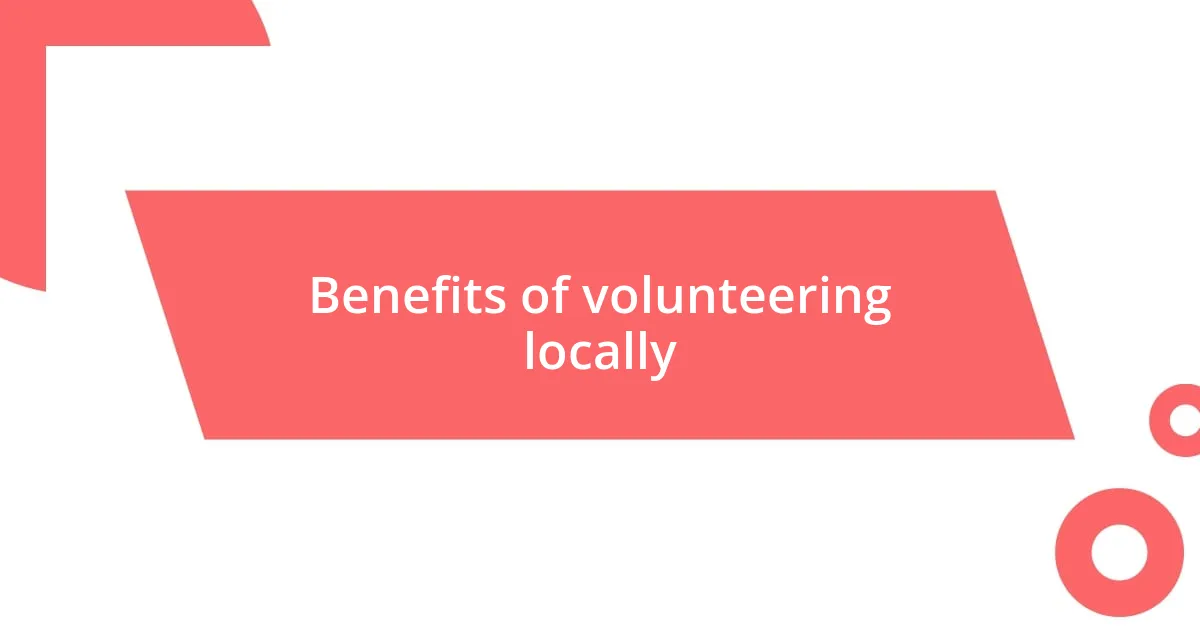
Benefits of volunteering locally
Volunteering locally offers profound benefits that extend far beyond the immediate contributions we make. I remember my first experience at a community garden; planting seeds with neighbors not only brought a sense of togetherness but also instilled a tangible connection to the local environment. How often do we get to witness the growth we contribute to in such a direct way? That day highlighted the joy of fostering community bonds while improving our surroundings.
Another incredible aspect of local volunteering is the opportunity for personal growth. I once led a workshop for kids on basic coding, a subject I was passionate about but had never taught before. The nerves I felt before starting melted away as I saw the spark in their eyes—suddenly, I was not just sharing knowledge but also cultivating my own skills in communication and leadership. Have you ever experienced a moment where teaching others also taught you something vital about yourself?
Moreover, local volunteer programs allow for deeper understanding and engagement with the issues affecting our communities. During my time at a shelter, I interacted with families facing homelessness, and these conversations opened my eyes to societal complexities. It’s easy to overlook these challenges from a distance, but being involved distinctly humanizes the statistics we often hear. I found myself reflecting on how I can contribute not just my time but also advocate for systemic change, proving that volunteering locally can spark both personal and broader societal transformations.
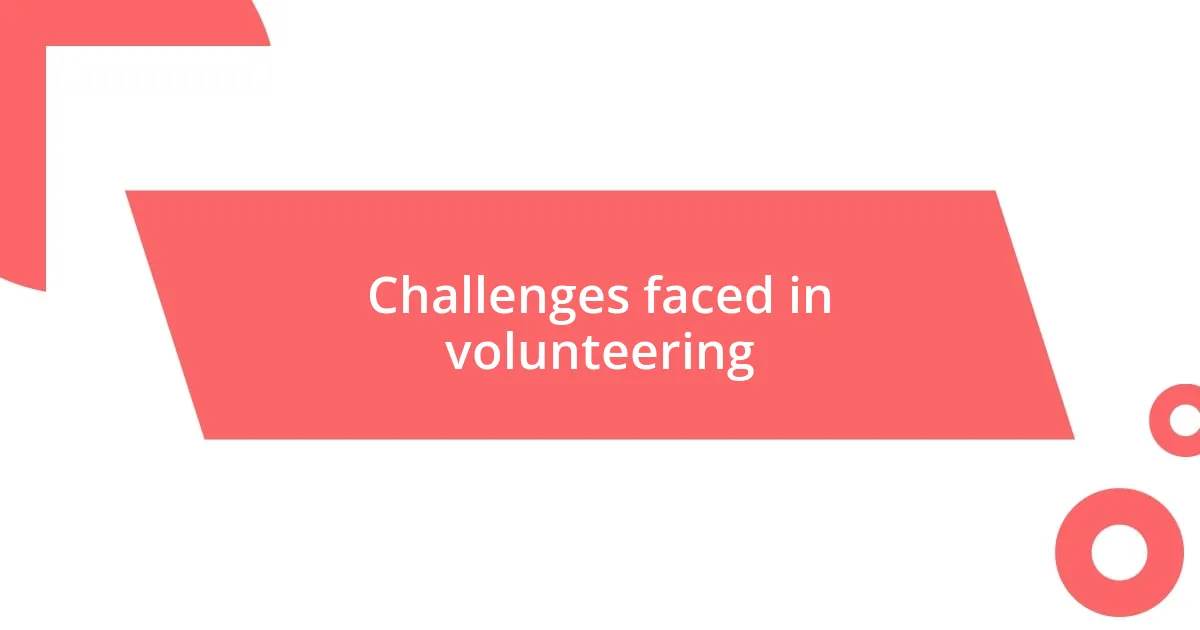
Challenges faced in volunteering
Volunteering is a rewarding experience, but it doesn’t come without its hurdles. For example, I once encountered a situation where communication barriers became a real challenge while volunteering at a local literacy program. It was frustrating to realize that many of the participants spoke different languages, and I often had difficulty conveying even the simplest concepts. I wondered if the struggle to communicate diluted the impact we hoped to create, and it left me feeling disheartened at times.
Another common experience I’ve faced is time management. Balancing volunteering with work and personal obligations can be tricky. I still remember a week where I overcommitted myself and had to miss a crucial planning meeting for an event I was passionate about. It felt like letting down not just my team but also the community we aimed to serve. Have you ever stretched yourself too thin while trying to do something good? It’s a reminder that self-care is vital even in the pursuit of altruism.
Lastly, I’ve encountered varying levels of commitment among fellow volunteers, which can be discouraging. During one initiative, we had volunteers who genuinely wanted to help, while others seemed disinterested. This inconsistency affected the morale of the group and the overall effectiveness of our work. I often ponder how crucial it is for everyone involved to share a common vision. When you’re surrounded by people who are just as motivated and invested, it can elevate the experience beyond what you ever anticipated. Have you noticed how collaborative spirit can transform challenges into triumphs? It certainly makes all the difference.
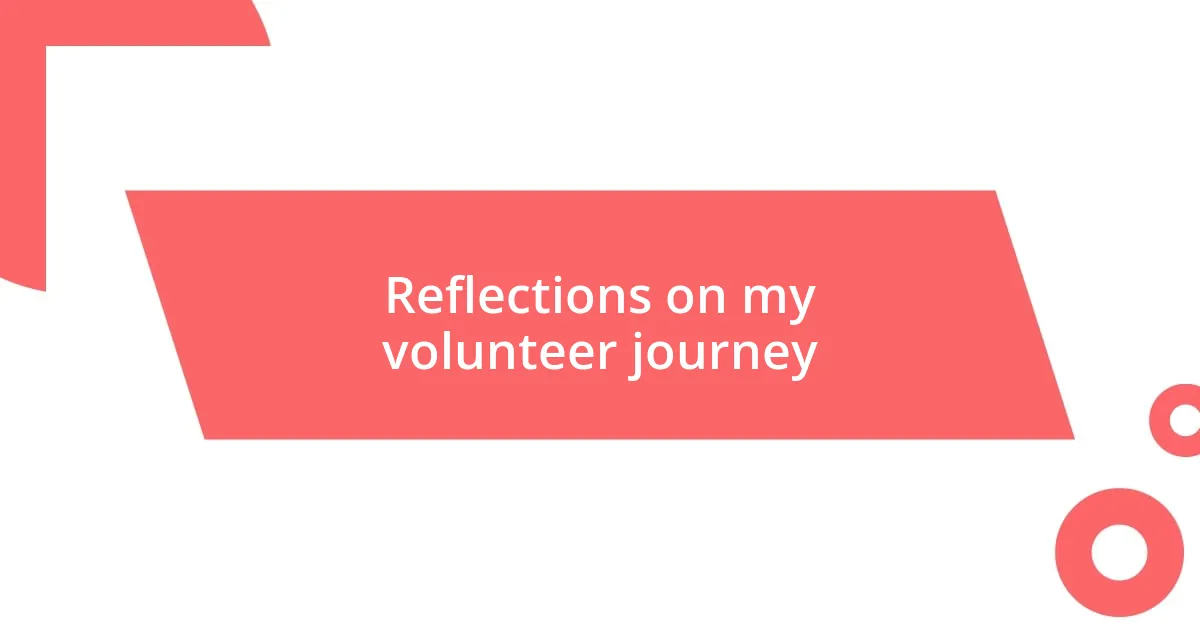
Reflections on my volunteer journey
Volunteering has been more than just an activity for me; it’s been a profound journey of self-discovery. I recall one chilly afternoon when I helped serve meals at a local soup kitchen. As I handed out plates, I overheard stories that lingered in my mind long after I left. Did I ever truly grasp how fortunate I was before that moment? It was eye-opening, showing me how diverse our experiences can be. This connection with others expanded my perspective and humbled me in ways I never expected.
Throughout my volunteer journey, I’ve often found myself in the role of a learner, gaining insights that shaped my understanding of community. While organizing awareness campaigns, I met passionate individuals who sparked my curiosity about social justice issues. Their stories were both heartbreaking and inspiring, leading me to question what it really means to advocate for change. Have you had a conversation that made you reevaluate your stance on an issue? Each interaction seemed to peel back layers of my naivety and challenge my assumptions.
There were also moments of doubt in my volunteer experiences. I remember feeling inadequate when leading a team project, unsure if my ideas were resonating with others. I would often glance at my teammates, grappling with whether I could truly inspire them. Yet, when we finally completed the project, seeing our collective efforts come to fruition reminded me that vulnerability can be a pathway to connection. Isn’t it fascinating how the fear of imperfection can sometimes lead to the strongest bonds? Those moments taught me that vulnerability is not a weakness; it’s a bridge that invites collaboration and understanding.










